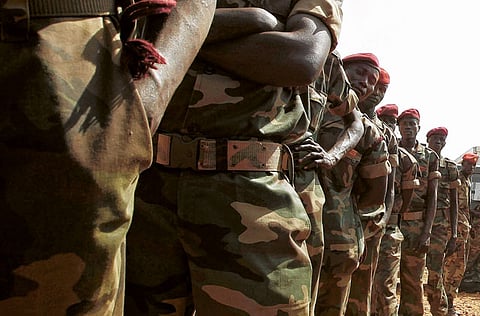South Sudan's dilemma
The people of the region think that with independence most of their problems would be solved, however, the reality is different

The people of southern Sudan have waited for this moment for six years. In fact, they have been waiting for 10 times that. People there have had their hopes dashed so often that they scarcely dared believe it could happen.
Even as recently as a month ago, many doubted the vote would happen at all. Nobody on the streets wanted to tempt fate by thinking about what was to happen afterwards. But over the past few days this has dramatically changed. Independence and freedom are no longer abstract concepts, but imminent realities.
The truth is that in the short term, even in the medium term, nothing much will radically change for those not living near the disputed borders. The hungry will still be hungry, the poor poor.
The south has had some autonomy since 2005. There is already a presidential executive, a legislature, a judiciary and a sizable civil service. The south has its own military the Sudan People's Liberation Army and its own police and security services.
However, in many important ways cultural, economic, and even psychological the burden of rule from Khartoum has still been a heavy one. The relief when it is lifted will be immense.
After the result is officially announced on February 14 or 15 an all-party conference will deliberate and decide on an interim government under the current president. But the decision must be reached before independence day, and will be hurried.
Also, the Sudan People's Liberation Movement (SPLM) currently in power in the south is likely to dominate proceedings and maintain a continuity of power.
There are several documents already in force that will most likely stay on as the skeleton of a new constitution. There is a large governmental organisation taking on the responsibility of arranging constitutional matters.
It has also been in charge of referendum security and logistics though not for the actual count and for housing returnees. It is called the Task Force, and is chaired by the vice-president, Riek Machar.
Scramble for slices
When he tells me with a smile that the new nation will be called not Azani or Cush or any of the other names that have been mooted but "South Sudan, for sure", you can bet that's what it will be called. He is a powerful man, but the job facing him is gargantuan. There will be an internal scramble for slices of the pie.
There is also the question of how the infant state will see itself in terms of its neighbours. The south will have to do business with the north, however bitter a pill that will be to swallow.
Currently Kenya, which has the closest reliable sea port, is likely to be a crucial trading partner, but Uganda is developing a road corridor that, when completed, will have a dramatic effect.
A new central African power bloc of southern Sudan, Uganda and Rwanda, which is a possibility, could upset Kenya. On top of that, the borders of the prospective state are yet to be fixed.
The SPLM, with many former soldiers, must quickly learn to be diplomats. The government will find it much easier to keep things close to the status quo than to attempt grand and ambitious changes. The business of designing a new nation will take a back seat to the business of satisfying the demands of the one that already exists.
Worse, the rain is coming. Between July and September, achieving anything at all will be excruciatingly difficult. Because of the cost of importing raw materials, paved roads cost a million dollars a kilometre, so there are few here.
Meanwhile, popular expectations are running absurdly high. People on the street believe that independence means jobs, roads and a better life, and believe these things will arrive without delay. It is the government that will first face discontent when these do not materialise.
I meet the governor of Unity province, where there has recently been violence. He remains philosophical.
"Issues with human beings are always difficult to manage," he says. "Governments come and governments go. The SPLM government must be up to the task. Otherwise the public will ask them to go. It is not going to be easy."
Nicky Woolf is a writer and journalist, specialising in politics and technology.


